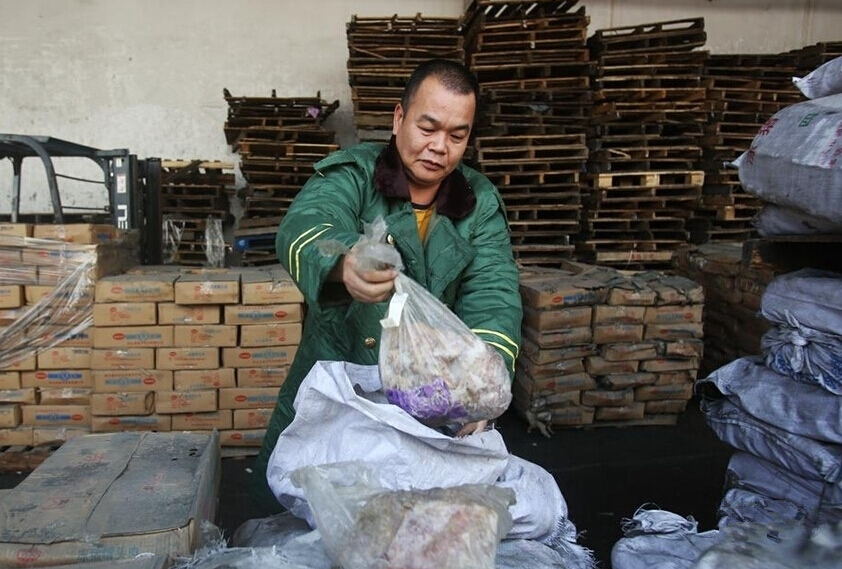Expired frozen meat mainly comes from US
- By Zhang Rui
 0 Comment(s)
0 Comment(s) Print
Print E-mail China.org.cn, June 30, 2015
E-mail China.org.cn, June 30, 2015
A Beijing News investigation found that most of the expired meat seized in the frozen meat scandal in China that broke in early June came from foreign strategic stockpiles, mainly from the United States.
 |
|
According to a Xinhua News Agency report on June 3, China‘s General Administration of Customs said it had confiscated more than 100,000 tons of frozen meat with an estimated value of more than 3 billion yuan (US$490 million) in a nationwide anti-smuggling campaign, including some dating from the 1970s. The meat was bound for restaurants in second- and third-tier cities in China. |
According to a Xinhua News Agency report on June 3, China‘s General Administration of Customs said it had confiscated more than 100,000 tons of frozen meat with an estimated value of more than 3 billion yuan (US$490 million) in a nationwide anti-smuggling campaign, including some dating from the 1970s. The meat was bound for restaurants in second- and third-tier cities in China.
The campaign, which focused solely on frozen meat smuggling, was launched earlier this month across 14 provinces and municipalities, including Beijing and Guangdong. According to the GAC, 21 organized gangs were busted and 130 suspects had been arrested so far in cases involving frozen chicken wings and beef.
A man surnamed Cui, a businessman involved in the beef trade, told the Beijing News that such frozen meat is primarily from foreign countries' strategic stockpiles, particularly those of the United States. When such stockpiles are replenished or replaced, some of the expired meat in the stockpiles will be put on the market.
"After being frozen for a long time, the meat will appear black due to oxidation, so it will not be sold directly to consumers," Cui said. "Restaurants will braise, fry and cook the meat with sauce, and then the meat will taste like normal meat, so it will be very difficult for average customers to tell that it’s different from fresh meat."
Many countries freeze a large amount of meat in strategic stockpiles or to stabilize prices. According to the rules issued by China's central government, frozen pork should be kept in refrigerated storage and rotated out of storage every four months, while frozen beef and mutton should be rotated out every eight months.
"In China, the rules indicate that the quality guarantee period is between eight and 12 months for beef and mutton. After the meat is expired, it is not allowed to be defrosted [and used]," Gao Guan, vice secretary of the China Meat Association, told Beijing News. "However, some other countries put the meat in reserve for two years, longer than we do," he explained. Guan added that although all countries have detailed stipulations about the quality guarantee period for meat, the management of refrigerated storage facilities differs, and not all rules are strictly enforced.
A staff member at the China Entry-Exit Inspection and Quarantine Bureau also told the Beijing News that the cost of freezing and storing meat in strategic stockpiles is very cheap: only about 17 yuan per ton for a year. The cheap cost is one of the factors that has boosted smuggling of expired frozen meat in recent years.
Beijing News also found that Beijing food markets rarely sell frozen meat, so the smuggled meat was usually sold to second- and third-tier cities in Sichuan, Hunan, Yunnan and Guizhou Provinces after passing through Hong Kong customs.
Anonymous sources with close connections to distributors said that such frozen meat is very cheap and often comes without inspection reports. To avoid inspection and quarantine, distributors avoid first-tier cities like Beijing and Shanghai. Smugglers also form tight networks of professionals, transportation routes and patterns.
A man surnamed Lin who works in the beef import business in Hong Kong told Beijing News that three- or four-decade-old meat is actually rare and only appears when foreign freezing facilities dispose of the meat. The most in-demand meat on the market is meat that has only been expired for one or two years. "Many dealers will show up at your doorstep when they hear you have expired meat, and they say they will buy all of it at 40 percent to 50 percent of the regular price."
For consumers, the most frightening thing is that it is very difficult to tell exactly how many years the meat has been expired and been kept in refrigeration, experts said. Current technology can only tell if meat is expired by examining the quality of the meat and the presence of bacteria.
Nan Qingxian, a professor at China Agricultural University, said that meat which has been frozen for a long time will suffer oxidation, color changes and nutrition loss. But when meat is transported through smuggling networks, it is very hard to say if storage environment standards can be guaranteed. "If the frozen meat thaws at any point, bacteria will grow in the meat very quickly and corrupt the meat. Even when such meat is frozen again, there will still be plenty of microbes in it, and this will be very harmful to the human body."
China has experienced a series of food scandals in recent years. The most recent high-profile case involved a U.S.-owned meat factory operating in China that was accused of selling out-of-date and tainted meat to clients including McDonald's, Starbucks, KFC and Pizza Hut.






Go to Forum >>0 Comment(s)